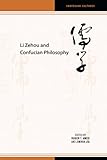Li Zehou and Confucian Philosophy / ed. by Roger T. Ames, Roger T. Ames, Peter D. Hershock, Jinhua Jia.
Material type: TextSeries: Confucian CulturesPublisher: Honolulu : University of Hawaii Press, [2018]Copyright date: ©2018Description: 1 online resource (408 p.) : 7 diagramsContent type:
TextSeries: Confucian CulturesPublisher: Honolulu : University of Hawaii Press, [2018]Copyright date: ©2018Description: 1 online resource (408 p.) : 7 diagramsContent type: - 9780824872892
- 9780824876104
- 181/.112 23
- B5234.L4874
- online - DeGruyter
- Issued also in print.
| Item type | Current library | Call number | URL | Status | Notes | Barcode | |
|---|---|---|---|---|---|---|---|
 eBook
eBook
|
Biblioteca "Angelicum" Pont. Univ. S.Tommaso d'Aquino Nuvola online | online - DeGruyter (Browse shelf(Opens below)) | Online access | Not for loan (Accesso limitato) | Accesso per gli utenti autorizzati / Access for authorized users | (dgr)9780824876104 |
Frontmatter -- Contents -- Series Editors' Preface -- Introduction -- Response to Paul Gauguin's Triple Question -- Part I. Li Zehou and the Modernization of Confucianism -- 1. Li Zehou and New Confucianism: A Philosophy for New Global Cultures -- 2. "Western Learning as Substance, Chinese Learning for Application": Li Zehou's Thought on Tradition and Modernity -- 3. Modernizing Confucianism: Li Zehou's Vision and Inspiration for an Unfinished Project -- 4. Determinism and the Problem of Individual Freedom in Li Zehou's Thought -- 5. What Should the World Look Like? Li Zehou, Confucius, Kant, and the World Observer -- Part II. Li Zehou's Reconception of Confucian Philosophy -- 6. Li Zehou's Lunyu jindu (Reading the Analects Today) -- 7. Li Zehou's Reconception of Confucian Ethics of Emotion -- 8. Li Zehou's Doctrine of Emotion as Substance and Confucian Philosophy -- 9. Li Zehou and Pragmatism -- 10. Li Zehou's View of Pragmatic Reason -- Part III. Li Zehou's Aesthetical Theory and Confucianism -- 11. Li Zehou's Aesthetics: Moving On after Kant, Marx, and Confucianism -- 12. Li Zehou, Kant, and Darwin: The Theory of Sedimentation -- 13. Li Zehou's Aesthetics and the Confucian "Body" of Chinese Cultural Sedimentation: An Inquiry into Alternative Interpretations of Confucianism -- 14. Modern Chinese Aesthetics and Its Traditional Backgrounds: A Critical Comparison of Li Zehou's Sedimentation and Jung's Archetypes -- 15. Li Zehou's Aesthetics as a Form of Cognition -- Appendix: Li Zehou's Life and Works -- Contributors -- Index
restricted access online access with authorization star
http://purl.org/coar/access_right/c_16ec
For more than a century scholars both inside and outside of China have undertaken the project of modernizing Confucianism, but few have been as successful or influential as Li Zehou (b. 1930). Since the 1950s, Li's extensive efforts in this regard have in turn exerted a profound influence on Chinese modernization and resulted in his becoming one of China's most prominent social critics. To transform Confucianism into a contemporary resource for positive change in China and elsewhere, Li has reinterpreted major ideas and concepts of classical Confucianism, including a rereading of the entire Analects, replete with his own philosophical speculations derived from other Chinese and Western traditions (most notably, the ideas of Kant and Marx), and developed an aesthetical theory that has proved especially far-reaching. Although the authors of this volume hail from East Asia, North America, and Europe and a wide variety of academic backgrounds and fields of study, they are unanimous in their appreciation of Li's contributions to not only an evolving Confucian philosophy, but also world philosophy. They view Li first and foremost as a sui generis thinker with broad global interests and not one who fits neatly into any one philosophical category, Chinese or Western. This is clearly reflected in the chapters included here, which are organized into three parts: Li Zehou and the Modernization of Confucianism, Li Zehou's Reconception of Confucian Philosophy, and Li Zehou's Aesthetical Theory and Confucianism. Together they form a coherent narrative that reveals how Li has, for more than half a century, creatively studied, absorbed, and reconceptualized the Confucian ideational tradition to integrate it with Western philosophical elements and develop his own philosophical insights and original theories. At the same time, he has transformed and modernized Confucianism for the purpose of both coalescing with and reconstructing a new world cultural order.
Issued also in print.
Mode of access: Internet via World Wide Web.
In English.
Description based on online resource; title from PDF title page (publisher's Web site, viewed 02. Mrz 2022)


